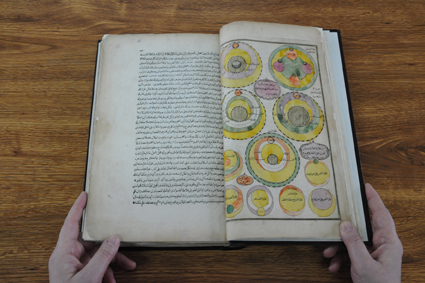Esra Ersen |
In her new installation When Thinking Some Play with the Mustache, Others Cross Arms, the artist Esra Ersen, who lives in Berlin, traces the gaps in memory and the white spaces in the history of Bulgaria.
In the footsteps of the early 20th century Ottoman travelers to the Balkans, Esra Ersen visits the Bulgarian capital Sofia. In talks with researchers and artists and during visits to archives and musea she learns of the contemporaneity of historical narratives and stereotypes. Her search aims for the crossing points of perceptions between feelings, experience and the past.
Bulgaria, which achieved its independence from the Ottoman Empire in several steps beginning in the late 1870s, has little room in its official culture of memory for this period of “500 years under the Ottoman yoke”. The selection of history as the fundamental precondition for finding one’s identity is found in every new national beginning, for example also in the founding of the Republic of Turkey, Bulgaria’s neighboring country and the legal successor to the Ottoman Empire. The found objects and stories that Esra Ersen brings together seem odd, but provide insight into a European past that can be a prospect for a supranational Europe.
Ersens work resulted from a collaboration with Leyla von Mende, PhD candidate at Zentrum Moderner Orient in Berlin, who is working on representations of post-Ottoman Southeast Europe in Ottoman travel writing.
In the footsteps of the early 20th century Ottoman travelers to the Balkans, Esra Ersen visits the Bulgarian capital Sofia. In talks with researchers and artists and during visits to archives and musea she learns of the contemporaneity of historical narratives and stereotypes. Her search aims for the crossing points of perceptions between feelings, experience and the past.
Bulgaria, which achieved its independence from the Ottoman Empire in several steps beginning in the late 1870s, has little room in its official culture of memory for this period of “500 years under the Ottoman yoke”. The selection of history as the fundamental precondition for finding one’s identity is found in every new national beginning, for example also in the founding of the Republic of Turkey, Bulgaria’s neighboring country and the legal successor to the Ottoman Empire. The found objects and stories that Esra Ersen brings together seem odd, but provide insight into a European past that can be a prospect for a supranational Europe.
Ersens work resulted from a collaboration with Leyla von Mende, PhD candidate at Zentrum Moderner Orient in Berlin, who is working on representations of post-Ottoman Southeast Europe in Ottoman travel writing.



